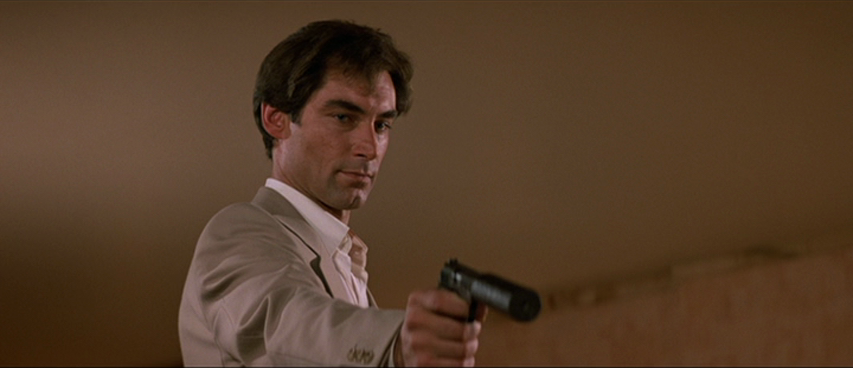Jake’s Take: One Image from The Living Daylights (John Glen, 1987)
The Arrival of Timothy Dalton and the “Back-to-Fleming” Approach
“I only kill professionals.”
When all else fails, or you’re uncertain of your direction, go back to Ian Fleming. Fleming provided the initial inspiration. He did so again when Craig walked in the door. And in between, he also inspired our first look at a truly dark Bond, courtesy of the classically trained Timothy Dalton.
Having read the Fleming novels at a rather early age, it’s fair to say I completely freaked out when I saw Dalton as Bond for the first time on the film’s teaser poster. “The most dangerous Bond. Ever.” Looking at the frame above, it’s easy to see that was the case. When I first saw the rest of this scene, with Bond threatening General Pushkin (the ever dependable John Rhys-Davies), the claim of the tagline became irrefutable. Dalton brought the gravitas to Bond that had been lacking since For Your Eyes Only, really. Bond was back on the edge, and more man than superman, as Dalton used to say in interviews. Dalton plumbed the depths of Fleming to reinvent the cinematic Bond, and what resulted was a more complex vision of the character—more romantic, gilt-edged, and deadly.
The Fleming influence comes across in this film through both pace and place. The Living Daylights has several flaws, but the pacing is not one of them. It is not as efficient a film as Quantum of Solace or as tight as From Russia with Love, but it moves very steadily and quickly nonetheless. Despite its somewhat flat aesthetic, the film has also always possessed a very distinctive sense of place. There is more globetrotting in this film than most (which contributes to the pace), and there are details in each of the places that remind one of Fleming’s descriptions of various things, be it food, drink, or clothes. An example would be when Bond and Kara (the enchanting Maryam d’Abo) check into their hotel in Vienna and she admires a dress which Bond later buys, not to mention the Stradivarius cello.
Dalton’s performance and a plot of defection and disinformation bring this installment back to the world of hard espionage, which takes it a long way with me. Critics accuse it of having a convoluted plot. I concede to its complexity, but it is hardly impenetrable if more than moderate attention is paid. Where the film’s detractors are correct is in the film’s deficit of a strong villain. Jeroen Krabbé’s Koskov is not nearly threatening enough, and Joe Don Baker’s Whitaker lacks both sufficient screen time and the required panache to be added to the pantheon of great Bondian villainy. The script retains some traces of Moore in the humor, with which Dalton does his best.
It’s a great shame that Licence to Kill was as far as he got in shaping his incarnation of Bond. One wonders how he would have been after two more films. Still I am grateful he got to do what he did, especially this film, which is the first Bond film I remember seeing in a theatre. That experience is something that, no matter how objective you like to think you are, will almost always play a role in your esteem for a particular film.
Rankings
2. On Her Majesty’s Secret Service
5. From Russia with Love
7. Thunderball
8. The Living Daylights
9. Goldfinger
10. Dr. No
11. For Your Eyes Only
12. The Spy Who Loved Me
15. Octopussy
17. You Only Live Twice
19. Moonraker
20. Live and Let Die
21. A View to a Kill
22. Diamonds Are Forever
23. The Man with the Golden Gun
JAMES BOND WILL RETURN IN LICENCE TO KILL.
